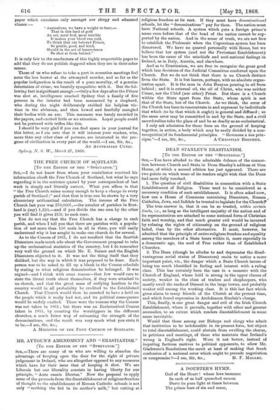MR. AYTOUN'S AMENDMENT AND "ERASTIANISM." [To THE EDITOR OF THE
"SPECTATOR."] SIR,—There are many of us who are willing to abandon the advantage of keeping open the door for the right of private judgement in Ireland, who are altogether opposed to any measures which have for their issue that of keeping it shut. We are Liberals but our liberality consists in having liberty for our principle, " Ante omnia libertas." Now the proposal to apply some of the proceeds from the disestablishment of religious freedom of thought to the establishment of Roman Catholic schools is not only " seething the kid in its mother's milk," but cutting at
religious freedom at its root. If they must have denominational schools, let the " denominations" pay for them. The nation must have National schools. A system which puts a foreign prince's name even before that of the head of the nation cannot be sup- ported by the nation. And in the sense of truth, we are not free to establish the Ptolemaic when the Copernican system has been discovered. We have no quarrel personally with Rome, but we believe that her system (and not the Protestant Establishment) has been the cause of the mischiefs and anti-national feelings in Ireland, as in Italy, Austria, and elsewhere.
And as to Erastianism, we are free to recognize the great good which late decisions of the Judicial Committee conferred upon the Church. But we do not think that there is no Church distinct from the State. It is but leaven, perhaps, with no absolute organ- ization apart. It is the man in John Bunyan pouring in oil from behind ; and it is external oil, the oil of Christ, who was neither Caesar, nor the Chief (nor other) Priest. But there is a Church within the State apart from the State, whose spirit is not that of the State, but of the Church. As we think, the error of the Church has been to concentrate in and represent by individuals that which (to be that which it ought) is general and diffused ; so the same error may be committed in and by the State, and a civil sacerdotalism take the place of and be as deadly as an ecclesiastical.
I only ask admission for these lines on the ground of keeping together, in action, a body which may be easily divided by a non- recognition'of its fundamental principles. " Revenons h nos prin-


































 Previous page
Previous page